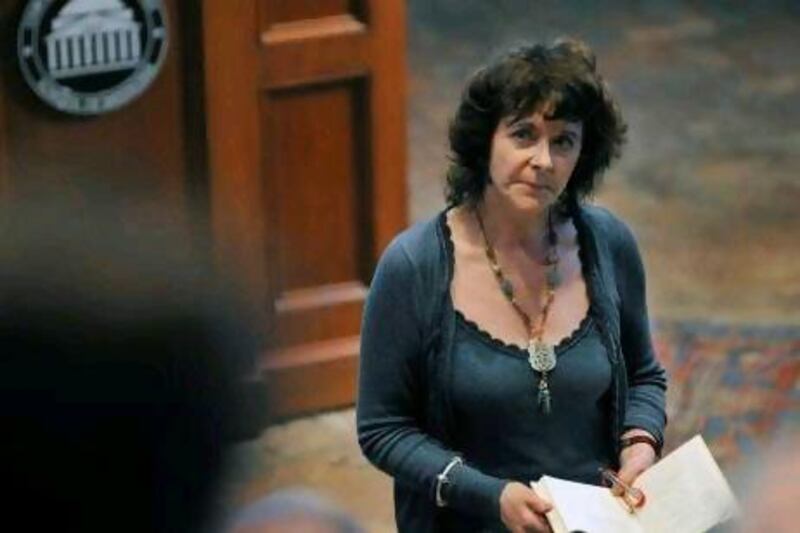"We're all from somewhere else." The poet and writer Ruth Padel is talking about one of the most important lines in her new book, The Mara Crossing. It's a quite beautiful combination of poetry and prose, taking in exotic birds transversing oceans, powerful mammals crossing wildernesses and humans journeying the globe in search of a better life. Binding it together is the notion of migration.
"All human life, all countries began with migration from Africa," she says. "Migration can be incredibly hard. It can be really fruitful. The world is full of people bringing up families in another place. It's like the swallows who go to Africa but come back to Europe. You start to think, where do these people actually belong?
Padel is, currently, not alone in pondering such questions. The issue of migration is proving fertile ground for contemporary writers, artists and thinkers. In London, Tate Britain's latest exhibition is called Migrations, gathering together everyone from Van Dyck to Mondrian in an attempt to understand how British art has been shaped by the movements of people and ideas. Padel has been to see it, and says it opens up fresh new ways of looking at art as a continual "flowing in" from somewhere else.
Closer to home, two of the novels shortlisted for this year's International Prize for Arabic Fiction also specifically refer to migration. Nasser Iraq's The Unemployed tells the story of a young Egyptian man forced to look for work in Dubai because there is nothing for him in Cairo; Rabee Jaber's The Druze of Belgrade tracks the adventures of a 19th-century Lebanese religious community exiled to the Balkans.
The eminently readable British literary quarterly Granta has even themed its current issue around the idea of departure and human movement. In Exit Strategies, the American writer Claire Messud talks of visiting Beirut and being completely surprised by who had settled there. "Repeatedly, I saw SUVs with Saudi or Abu Dhabi plates," she writes. "Smooth young men on mobile phones, with white kaffiyehs, holding the hems of their pristine white djellabas above the dirt."
So why is the question of migration interesting to so many writers? Padel thinks the reason may be wrapped up in a derivative of the word - immigration.
"The theme of immigration is becoming more and more political, so everyone is thinking about it in new ways," she says. "And when they do, they realise that everyone's identity is bound up with and founded on migration in some way. So, for example, in the Tate exhibition they want to make the point that in Britain we are all from somewhere else, that British identity has always been an evolving thing and still is."
Happily, The Mara Crossing doesn't limit itself to the British Isles. In one of its most striking sections, Padel describes a visit to Kenya which, for her, sums up the "unstoppable pull of migration". She looks on as wildebeest, zebra and gazelles stare at the Mara River, the end of their journey. On the other side lies their goal: fresh grass. But first they have to negotiate a river teeming with crocodiles. "A slash of brown lightning, a split-second open jaw and their boy was gone."
It's where Padel's seven-year journey to understand migration began. "These poor creatures walking for three months so they can cross a river of crocodiles," she remembers now. "It became for me an image, a metaphor for how difficult the crossing to another place is."
And in the course of those seven years she came across migrant workers from Nepal constructing roads in Bhutan, Indian families in Bahrain who worked for a while in the kingdom and then returned home. Greeks who lived in Australia for most of the year but went back to their homeland for the summer months. All very familiar scenarios, of course, for people who live and work in the Emirates.
"Of course. And I would like this book to encourage people to reflect on who they are and where they're from. As you get older, where you grew up becomes more important, and you return to it in your mind as a way of explaining things - because your childhood makes you, really."
And for Padel, who is from England but has lived in Greece and Ireland, France and India, writing The Mara Crossing enabled her to answer these questions of belonging. "Migration can mean different things. We all experience it when our children grow up and leave home, for example. But I really want people to empathise with others who have to move - as I imagine every writer who tries to explore this subject does. This world of migration can be very, very hard - and in the end we all need a boundary to draw around us and look at the world from, to feel safe in. We all need a home, whatever that means."
The Mara Crossing (Chatto & Windus) and Exit Strategies (Granta) are out now. Migrations is at Tate Britain until August 15. The International Prize for Arabic Fiction is announced on March 27





